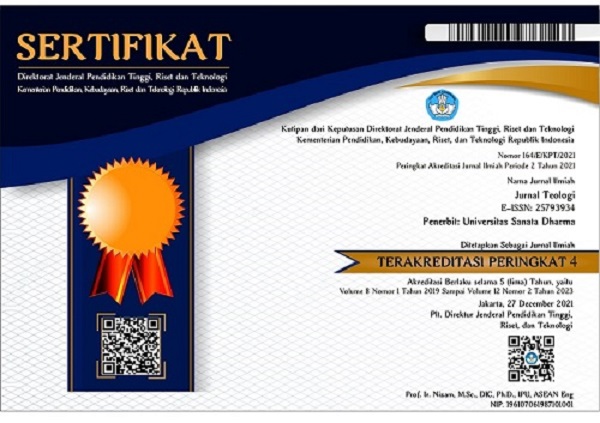Memulihkan Wibawa Allah sebagai Gembala Israel: Kritik atas Para Pemimpin Yehuda di Yehezkiel 34
(1) Sanata Dharma University
(*) Corresponding Author
Abstract
Di tengah-tengah krisis yang dialami oleh bangsa Israel di tanah pembuangan Babilonia, Yehezkiel tampil sebagai nabi pembawa penghiburan. Ia memimpin orang-orang terbuang untuk membangun identitas baru sebagai bangsa yang dikasihi oleh Allah. Salah satu pesan yang diwartakan oleh Yehezikel adalah pilihan Allah untuk memulihkan wibawa-Nya yang telah direndahkan oleh para gembala Israel yang justru menggembalakan diri mereka sendiri, mengabaikan dan menindas domba-domba Israel. Artikel ini meneliti dan membahas dasar ideologis kritik Yehezkiel terhadap para pemimpin Israel di Yehezkiel 34. Dalam situasi restorasi Israel di tanah pembuangan, Allah berkehendak untuk memulihkan kembali kekudusan nama-Nya. Ia juga memulihkan kembali otoritas-Nya sebagai Gembala Israel yang telah dirusak oleh para pemimpin Israel. Allah akan memberhentikan mereka sebagai gembala dan akan menjadikan diri-Nya sebagai Gembala Israel.
Keywords
Full Text:
PDF (Bahasa Indonesia)References
Bergant, D. The Collegeville Bible Commentary, Collegeville: The liturgical Press, 1989.
Block, Daniel I. The Book of Ezekiel, Grand Rapids: WB. Eerdmans, 1998.
------------, Beyond The River Chebar. Studies in Kingship and Eschatology in the Book of Ezekiel, Cambridge: James Clarke & Co, 2013.
Clark, Terry R. I Will Be King over You. The Rhetoric of Divine Kingship in the Book of Ezekiel. Piscataway, NJ: Gorgias Press, 2014.
Duguid, Iain M. Ezekiel and the Leaders of Israel, VTSup 56, Leiden: Brill, 1994.
Eichrodt, W. Ezekiel, OTL, Philadelphia: WJKP, 1970.
Ganzel, T. “The Descriptions of the Restoration of Israel in Ezekiel,” Vetus Testamentum 60 (2010): 197-211.
Nissinen, Martti. “(How) Does the Book of Ezekiel Reveal Its Babylonian Context?” Die Welt des Orients 45 (2015): 85-98.
Obinwa, Ignatius M. C. “I Shall Feed Them with Good Pasture” (Ezek 34:14): The Shepherd Motif in Ezekiel 34. Its Theological Import and Socio-political Implications, FB 125; Wurzburg: Echter, 2012.
Odell, Margaret S. Ezekiel, Smyth & Helwys Bible Commentary, Macon, Georgia: Smyth & Helwys, 2005.
Rom-Shiloni, D. “Ezekiel as the Voice of the Exiles and Constructor of Exilic Ideology,” Hebrew College Annual 76 (2005): 1-45.
Rom-Shiloni, D. – Corrine Carvalho. “Introduction,” Die Welt des Orients 45 (2015): 3-9.
Sarwar, Chaudhary I. “Future of Ethically Effective Leadership,” Journal of Business Ethics 113 (2013): 81-89.
Strine, C. A. Sworn Enemies. The Divine Oath, the Book of Ezekiel, and the Polemics of Exile, Berlin: De Gruyter, 2013.
Strine, C. A. – C. L. Crouch, “Yhwh’s Battle against Chaos in Ezekiel: The Transformation of Judahite Mythology for a New Situation,” Journal of Biblical Literature 132 (2013): 883-903.
Tsang, S., “A Call to Leadership: Character Study of Ezekiel and the Temple Staff,” CGST, 44 (2008): 151-172.
DOI: https://doi.org/10.24071/jt.v10i1.2740
Refbacks
- There are currently no refbacks.

This work is licensed under a Creative Commons Attribution-ShareAlike 4.0 International License.
.jpg)
Indexed and abstracted in:
P-ISSN: 2302 - 5476 (Validity starting Volume 2012-10-05)
E-ISSN: 2579 - 3934 (Validity starting Volume 6, No. 1, Mei 2017)
Jurnal Teologi (Journal of Theology) by Faculty of Theology Sanata Dharma University

This work is licensed under a Creative Commons Attribution-ShareAlike 4.0 International License.














